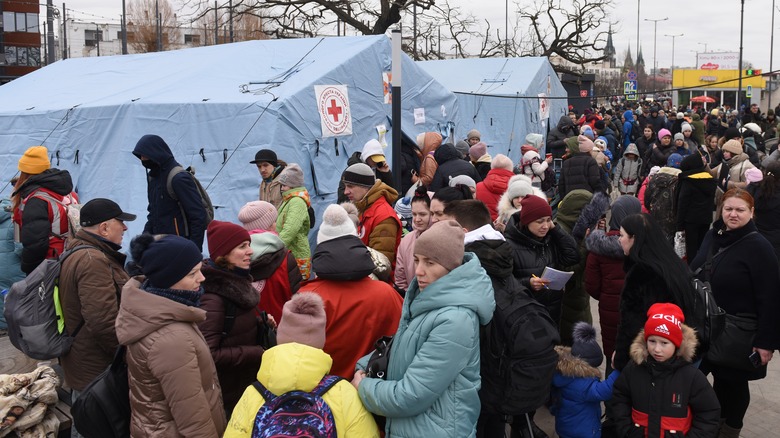Disease Outbreaks In Ukraine Could Be A Less Visible Impact Of War
Russia's invasion of Ukraine has caused widespread devastation throughout the country, resulting in mass casualties and serious injuries in need of immediate medical treatment. However, the health consequences of the war could extend far beyond the effects of combat, bombings, and shellings. According to the New York Times, experts are sounding the alarm on a less visible impact of the war: disease outbreaks. In addition to a potential rise in COVID-19 cases, Ukraine could also see a surge in other infectious diseases, including HIV, hepatitis, and tuberculosis.
Although Ukraine struggled with infectious disease epidemics even before the war, current conditions could result in what is being referred to as a public health disaster. That's because many Ukrainians are already living with HIV or hepatitis C, and with such low vaccination rates against diseases like polio and measles, overcrowded and unsanitary conditions could lead to major outbreaks. The war has also resulted in substantial delays in diagnosis and treatment, which could have serious long-term health consequences for people with chronic conditions.
Hospitals are struggling to treat people
According to CNN, the fighting has damaged and destroyed many hospitals and medical facilities across the country, disrupting the nation's health care system, which was already fragile to begin with. So far, there have been 31 reported attacks on Ukraine's health care system, 24 of which were direct attacks on hospitals. This means that many Ukrainians no longer have access to potentially life-saving medical care.
Kate White, an emergency program manager for Doctors Without Borders, told CNN that many cities now lack electricity and clean water, placing the population at an increased risk of contracting infectious diseases. Although there are hospitals that are still operational, dwindling medical supplies make it difficult for doctors to provide adequate care to everyone in need. As a result, conflict-related injuries are taking precedent over infectious diseases, causing other conditions to worsen. According to White, this is only the beginning of the "burden that the health system is going to face" as the war continues to escalate.


